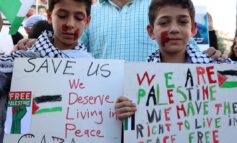Ireland plans to file an argument in South Africa’s genocide case against Israel at the International Court of Justice, according to the Irish government, making the move as the country has strongly condemned Israel’s actions against civilians in Gaza.
South Africa has brought a case against Israel in the I.C.J., the United Nations’ highest court, arguing that Israel is committing genocide, a claim Israel has denied. Ireland did not outline the argument it planned to advance, but the country’s lawmakers have made repeated calls to prioritize the protection of civilians in Gaza.
The United Nations allows countries to “intervene” in proceedings if they are parties to the United Nations’ 1948 Genocide Convention. Micheál Martin, the Republic of Ireland’s foreign minister and deputy leader, said that officials were working on a “declaration of intervention” in the case that, if approved by the Irish government, would be filed with the court, in The Hague.
Dublin joins South Africa’s case in the international court of justice, arguing that stopping delivery of essentials may constitute “genocidal intent”
“It is for the court to determine whether genocide is being committed,” Martin said on Wednesday. “But I want to be clear in reiterating what I have said many times in the last few months: What we saw on 7 October in Israel, and what we are seeing in Gaza now, represents the blatant violation of international humanitarian law on a mass scale.”
He urged Israel to call a cease-fire, and then listed a number of pressing issues, including “the purposeful withholding of humanitarian assistance to civilians”, “the targeting of civilians and of civilian infrastructure” and “the collective punishment of an entire population.”
“The list goes on,” he said. “It has to stop. The view of the international community is clear. Enough is enough.”
Irish lawmakers were among the first in Europe to call for the protection of people in Gaza last year, a reflection of Ireland’s longstanding support for Palestinian civilians, rooted in part in a shared history of British colonialism. Ireland’s own experience with a seemingly intractable and traumatic sectarian conflict — The Troubles, which came to a close with the 1998 Good Friday Agreement — has also driven that affinity.
The decision to file a declaration of intervention was made in consultation with several partners, including South Africa, Martin said. The Irish government does not plan to take a side in the dispute, the government told several Irish news outlets.
In January, Germany became the first country to announce that it would intervene in the case, saying that there was “no basis whatsoever” to South Africa’s claim that Israel was committing genocide in the war. The United States has called the case meritless, and several European countries have rejected it, too.
Irish politicians have made repeated calls for Israel to prioritize the protection of civilians in Gaza over their military aims. Martin said that the intention is that its declaration would be filed once South Africa has filed its written arguments, a process that is likely to take months.
The allegation that Israel has carried out genocide in Gaza — one of the most serious crimes a country can be accused of — is particularly significant in Israel, which was founded after millions of Jewish people were murdered during the Holocaust.
The U.N. genocide convention, to which Israel is a signatory, defines the crime as one with a proven intent on the part of perpetrators to physically destroy a national, ethnic, racial or religious group.
The South African government maintains that it is pursuing its case to stop a genocide, but analysts say it is also motivated by longstanding domestic support for the Palestinian cause. Israeli leaders have said that South Africa’s allegations pervert the meaning of genocide and the purpose of the 1948 genocide convention.






Leave a Reply